
mobile - desktop
 | mobile - desktop |
 |
 Contact Sales! |
|
News & Events:
|
|
Reptile & Amphibian
News Blog Keep up with news and features of interest to the reptile and amphibian community on the kingsnake.com blog. We cover breaking stories from the mainstream and scientific media, user-submitted photos and videos, and feature articles and photos by Jeff Barringer, Richard Bartlett, and other herpetologists and herpetoculturists.
Friday, March 30 2012Beating a Misdiagnosis
Every once in a great while, an event changes your perception of both your pets and the larger hobby around you. The event can be big, such as the discovery of a game-changing morph; or it can be small, such as the unexpected death of a favorite herp -- but whatever that trigger is, it redefines your comfort and practices forever. The post that follows relates such an event. It is, I suspect -- given the tendency of people to skim long posts and thus miss facts -- a risky move. However, I think the lessons it teaches on the importance of measured reactions, strict procedures, and only using the best “exotic” specialists in the industry are crucial for any keeper; and the events described were not only clearly someone else’s fault, but we took extreme measures to fix them. In the end, everything turned out alright -- but it came tragically close to not being that way.
By way of background, Living Gems Reptiles had lost three animals at the time these events unfolded: Topaz, a stunning orange-red female we had for four years, who passed away from advanced pneumonia in October 2011 (she is the primary animal mentioned below, and her story can be found here); Vlad, an above-average orange male we had since June 2010, who was recovering from an odd infection then suddenly passed away after a difficult tube feeding in October 2011 (his necropsy picked up fluid in his lungs and a strange liver condition); and Hills, a gorgeous high-orange male we had since June 2010 who passed in August 2011 from a simple respiratory infection we accidentally caused (his necropsy turned up nothing unusual). Topaz and Vlad were mates from the 2011 breeding season. Hills was not connected to them in any way. All three animals had been on strict quarantine for some time before passing, the last one starting at the end of August. We also had two August 2009 juveniles that had developed odd scale blemishes, Lancelot and Tigers Eye, both of whom were also on quarantine, and one of whom plays a role in this story. Other a single death back in 2009, these were the first health issues our main collection had ever experienced. ------ Living Gems Reptiles has always prided itself on its thorough care and procedures. We buy 95% of our animals only as babies from top breeders of our species, and carefully screen the (very) few exceptions to learn both past ownership of the specific animal and the general history of its bloodline -- and we ask a lot of questions about those animals. If we cannot find enough information, we will simply walk away from a deal. Regardless of origin, we put all new animals through a strict, no-exceptions quarantine in enclosures that have been pre-treated for mites. We set that quarantine to the maximum length of the advised range, a full six months. And during this quarantine, we subject all acquisitions to careful weekly inspections, so that we can catch and eliminate any threat as soon as possible. While our front-end procedures catch 99% of problems, we also have recurring and back-end procedures that form additional safety nets. On a weekly basis, for example, all members of the collection are carefully inspected, and records are periodically reviewed for any unusual patterns such as weight loss or skipped sheds. On the back end, in the rare event that an animal in our collection unexpectedly passes away, we have a necropsy performed to learn the cause -- as opposed to just trashing the body like so many vendors do. The combination of all these precautions means that real problems are very, very rare. Which is why it was such a surprise when a necropsy came back on Topaz, a prize female that had been in our care for almost four years under excellent care, noting the cause of death as severe pneumonia caused by an unusual strain of bacteria. That diagnosis, though controllable, was troubling enough. However, the pathologist took it a step farther by reporting not only bacteria, but also IBD and possible PMV -- both of the worst possible reptile illnesses, together in one animal. What makes this such a complete tragedy and vivid lesson is that, while we did not know it at the time, those last two diagnoses were totally and completely false. For those unfamiliar with the illnesses listed above, the first abbreviation, IBD, stands for inclusion body disease, one of the disease nightmares of the snake world. While a definitive cause is unknown, it is highly contagious across many species of boas and pythons. Symptoms include neurological (the classic head tremors and star gazing), digestive, and secondary infections. There is no known cure, and it is always (eventually) fatal. The second abbreviation, PMV, stands for paramyxovirus, and is also about as bad as you can get. While a diagnosis in boas would be shockingly rare -- it is a disease of the viper world -- there have been a bare handful of cases reported in boas, about one a decade since the disease was first identified 35 years ago, and usually in mixed viper-boa collections. Symptoms range from respiratory to neurological to digestive and more. While unlike IBD there have been reports of recovery, with this disease too there seems to be no known cure. So what do you do when you get a diagnosis of IBD? (PMV, due to the “possible” flag, was secondary at this early point.) The usual suggestion, as relayed by several “concerned” keepers I know, is to destroy every single animal in your collection, toss all your equipment, wait a year, and then start over. Keep in mind our collection did not have either disease when we were being told this. Thankfully, I’m a stubborn guy who insists on a scientific approach. The deceased animals had displayed none of the classic front-line symptoms of either dread illness. None of my other animals were showing signs of either highly contagious disease. And the idea that one animal who had been with me for so long could have magically developed all three diseases made me wary to start. Either there had been a misdiagnosis, or -- as was whispered in my ear by reptile friends, but I did not want to believe -- someone had deliberately dealt me a bad card. So, since I had major doubts, I set out to get second opinions. The first thing I did was write the experts. Dr. Edward Wozniak, who did a pioneering IBD study in the late 1990s, was the first to reply, and his advice was both absolute and a first hint: “I wouldn’t do anything just yet…. [Dr. Elliott Jacobson and I] have had a full time graduate student working on [IBD] since 2008 and she has greatly advanced the understanding of the disease but even with that, many questions remain. We have still yet to confirm the source of the protein that accumulates in the structures (inclusions) for which the disease was originally named…. While this may seem trivial, it means a lot about the actual cause of the disease and the diagnostic value of simply seeing inclusion bodies in tissue specimens.… It should also be mentioned that many ‘types of inclusions’ can look the same and just seeing such structures on a slide really don’t mean that you have IBD. The true IBD inclusion contains a very unique protein and are classified as non-viral inclusions. Just seeing a red staining body inside a cell really doesn’t mean that the snake has the disease we now call IBD. Without going to electron microscopy and/or other advanced methodologies, its virtually impossible to definitively identify a given inclusion body as an IBD inclusion.” The emphasis is mine -- but the fact that inclusions could be present but not IBD was new information to me. Dr. Wozniak also told me a new blood test had been developed for the disease that was much less invasive than the biopsy method, and that he felt provided definitive results: “Two of the big accomplishments that were recently achieved in our IBD research were 1) the re-creation of a highly specific monoclonal antibody that can be used to specifically stain and identify inclusion bodies as IBD inclusions and 2) the ability to use this antibody on blood rather than tissue samples. With those developments we can now simply draw a blood specimen and use it in much the same way that I used liver biopsy specimens in my original research. This is a huge leap forward because you can easily test a given animal with a simple blood draw and classify it as IBD positive or IBD free.” I next spoke with Dr. Rita (Li-Wen) Chang, a PhD student under Dr. Jacobson (the same doctor as above, and one of the leading authorities on IBD). In a very generous phone conversation, she confirmed what I had learned so far, and also elaborated a bit further on the new test, saying that while it was still not 100% definitive, it was the best way to screen large numbers of animals. Another key fact was that, despite what everyone reads on the web, a viral cause of IBD had not yet been proven -- which was important because it quickly showed me that most of the conventional web advice on IBD, much of it littered with official-sounding references to viruses, is based on unproven assumptions. I next spoke with Dr. Doug Mader, who should be familiar to many readers of this post as the author/editor of the Saunder’s authoritative “Reptile Medicine and Surgery” publication. Possibly the best-known reptile vet in the business, we spoke on the phone for over 30 minutes, and kept in touch afterwards. Dr. Mader, in turn, put me in touch with Dr. Thomas H. Boyer. A local California vet, Dr. Boyer specializes in the veterinary care of reptiles and amphibians. He was a co-founder of the Association of Reptilian and Amphibian Veterinarians, has published two books on reptile medicine, and is only one of only five Diplomates of the American Board of Veterinary Practitioners, Reptile and Amphibian Practice. He and his associate Dr. Zachary J. Steffes -- who has the best "bedside manner" I've ever experienced from a vet -- were the expert “boots on the ground” for this project, though they kept in touch with Dr. Mader throughout. As their names will probably be unfamiliar to readers, full biographies for both men can be found here: [url]http://www.pethospitalpq.com/site/view/186194_MeetourDoctors.pml[/url]. As a result of the last two conversations, two decisions were made. In the first, the lab that had diagnosed Topaz would run some (generously free) tests on Vlad to see what he tested positive for. In the second, I made the difficult choice to put down Lancelot, one of the juveniles with the odd scale problem, in order to give us a more comprehensive set of tissues (the two deceased snakes had only limited and now dated samples available). It was suggested I just send Lance down via overnight mail…but that did not sit right with me. Part of owning a pet is taking responsibility for the hard parts, and I felt the least I could do is drive him down in comfort myself. So, the next Saturday, I did. I was not there for the actual procedure, but was told by the euthanizing vet that Lance was “a good snake” all the way to the end. (I know some of these names may be unfamiliar to newer keepers, so I would appreciate it if some of the more experienced readers could weigh in on the caliber of these names to clarify why they mean something.) But lab tests take time, so while they worked, I was stuck in wait mode. I don’t know if it’s possible to describe the paranoia and dread you feel when managing a possible triple outbreak in what many have acknowledged is a top-notch collection. It’s a truly horrible experience. Every single action has to be performed in a manner that minimizes the possible transmission of disease. In my case, from the time I received that first report, I implemented a draconian quarantine: I handled all animals using not only latex gloves, but disinfected both hands and tools with bleach between each and every snake. As a further precaution, I divided my vivs into small quadrants based on risk, and between every quadrant performed additional disinfecting. That level of caution imposes a terrible toll, because every possible source of contamination -- be it a stray piece of moss, a falling drop of water, or a snake simply touching your arm -- has to be immediately and thoroughly sanitized. Your time commitment goes up by a factor of four or five. Weekly cleaning, which used to take two to three hours, now took ten. Monthly weigh-ins, which used to take three hours, now took a full fifteen. I showered right after every cleaning session…just in case. A new weekly activity involved disinfecting all handles and knobs in the house…just in case. You go through endless supplies of bleach and paper towels and gloves. Your free time and social life both go to hell/heck. As anyone in this situation should, I also suspended all sales and canceled all acquisitions. I gave up a lot of business and passed on two great animals during that time. I also avoided any and all reptile shows -- which I love -- just in case my hunches were wrong. All, to repeat, for two diseases we did not have. The labs, both busy places, took a long time to get back to me. Vlad’s samples were submitted on October 11, and Lancelot’s on October 24. It was November before I started getting answers. In the meantime, it was more agonizing cleaning and worry. You start jumping at ghosts that aren't there. One night, one of my top females scared me by regurgitating a meal she had swallowed just moments before. Was it a sign related to digestive issues? I watched her, and realized she was acting like I’d startled her. I froze, and she started nosing her meal, then latched on to it again. I slowly turned out the lights and slunk from the room. When I came back 30 minutes later, the rat was gone. A week later, she had kept it down and was acting as healthy as ever. On November 1, the original lab came back with a final report on Vlad. His cause of death was noted as “disseminated hepatic heterophilic granulomas with intralesional acid-fast positive bacilli, and with variably proliferative pneumonia.” This was “consistent with a bacterial infection.” However, the summary cause of death did not mention IBD. It was only in reading the extended print that the pathologist mentioned “rare discernable…inclusions.” That surprised me: as Vlad had lived with Topaz for four months, and with IBD as contagious as it is said to be, why wasn’t it listed as a primary cause of death, just as it had been for her? And why were the inclusions, when in this case they would have been specifically looking for them, only noted as “rare”? Most significant of all, as he was the “noob” in the collection and therefore the presumable carrier, why no diagnosis? That same afternoon, the preliminary results came back from ZooPath on Lancelot. He did indeed have the bacterial infection, presumably passed from Topaz or Vlad. But he, as verified by both Garner and a second pathologist at the firm, did not show any signs of the far more communicable IBD or PMV. (In the report’s very definitive wording, “this snake does not have inclusion body disease or paramyxovirus infection.”) Those reports were my second big hint that something was very wrong with the original results. After discussing with the various vets, we decided to wait until the final results came back on Lancelot before making any further testing decisions. Again, that took weeks. More bleach, unhappy girlfriend. I saw more “ghosts.” Another one of my snakes scared me with a bad shed -- it was patchy, though she managed to get everything off except her chin. Was it a sign related to a secondary symptom, shedding issues? It was only after I thought about it that I realized we’d just entered the winter season, which -- combined with less spraying of the cages to lessen risk -- meant lower humidity. She continued to act fine, and ate a full-sized meal with gusto two days later. A few days past that, I soaked her for two hours and then tried gently rubbing it off. As with all our long-term boas, she was a total sweetheart about being poked and prodded, and I worked a bit off. Unfortunately, I also discovered that trying to assist-shed a friendly but squirmy adult snake while preventing too much contact and wearing latex gloves is impossible. Thus, after reducing the area a bit, I surrendered her back to her viv to let her work the patch off over time, and instead just made sure to keep her humidity high. I also began to dig for additional information on the bacteria. Things began to fall into place when I discovered that members of this particular bacterial genus, the “mycobacteria,” can generate surface and secreted proteins -- in other words, inclusions. (A great example of this phenomenon, which is apparently common to many types of bacteria, is this article: On November 15, the final results came back for Lancelot. Findings were as before: no IBD, no PMV, just bacteria. At this point, the vets were all suspecting the first results were wrong. We decided to take two more actions: one, have Dr. Garner re-examine the original two samples to see if there had indeed been a misdiagnosis; and two, test the bacteria to determine which strain it was -- thus giving us a more definitive lead on how to proceed. Due to some confusion at the original lab, samples were delayed by a full week, and only sent out on November 23. My downstairs neighbor now got into the act by accidentally setting his apartment on fire. Badly. Have you ever planned for an evacuation of 30+ reptiles in five minutes under quarantine conditions in cold winter weather? Neither have I. Instead I grabbed a fire extinguisher and waded into the firefight. I played only a minor role before the fire department arrived, but we won, burns and all. It did not, however, help my stress level. As was the now-familiar pattern, the analysis took weeks. While the makers of Clorox and Bounty got rich, my world continued to go to hell/heck. I saw more “ghosts.” A third snake started getting food-fussy. She refused one meal on November 8, the next on November 22, and a third after that. Was it a sign of some other horrible problem? Then I looked over her care history and recalled she had done this periodically since she was a young adult -- always with reason, such as food that had been in the freezer too long for her taste, or she was in shed, or it was winter and therefore breeding season. Each time, she would refuse meals until bribed with a few live mice, after which she would return to regular feeding. I even recalled a conversation about it on the Kingsnake forum from last year, where it had been pegged as completely normal. So I finally offered those mice, and she downed four in one sitting, then looked around for more. On December 7, the long-awaited re-test results finally came in. The official diagnostic report for Topaz, the original and main IBD/PMV suspect, listed the cause of death as (primary) “severe granulomatous bronchointestinal pneumonia with intralesional bacteria” and (secondary) “atrophy, edema, microgranulomatosis, mild fatty change, and pigment deposition, liver.” It ended with the words “I saw no evidence of paramyxovirus or inclusion body disease in the examined sections.” Diagnosis reversed. The official diagnostic report for Vlad listed the cause of death as (primary) “severe granulomatous necrotizing hepatitis with intralesional bacteria” and (secondary) “moderate interstitial pneumonia.” It ended with the words “lesions characteristic of inclusion body disease are not represented in the examined sections.” For paramyxovirus, although the pathologist found evidence against, he lacked the full tissue samples needed to render a final opinion. He did, however, come pretty close for a scientist who has to watch his legal back: “paramyxovirus or other viral infection is considered unlikely.” While I suppose that will worry some people, let me put it in perspective, and in three ways. One, only a possible diagnosis had been made…of an obscenely unlikely disease in boas…based on incomplete samples…by a pathologist with a terrible track record on this case…who missed significant evidence against found by one of the best reptile pathologists in the business. Two, Dr. Boyer is one of the few top reptile vets with hands-on experience with a PMV case in non-vipers, and he -- who has now held every snake in my collection -- said its symptoms absolutely do not match what I had experienced. Finally, and most damning of all, while mycobacteria can be serious, it is far less contagious than PMV, which can sweep through a collection in weeks. It is unlikely that a snake with both illnesses would manage to pass only the less virulent one along. Yet Vlad did this once. In fact, Vlad did this twice. And one of those cases was to an animal that lived in the same viv as him for a whopping 17 weeks. That just does not happen. Based on the combined results, the consulting vets -- again, top experts in the industry -- both felt that PMV was not a real issue. I raised the idea of having additional animals screened anyway, but was told it was a waste due to the reasons above. So, again, diagnosis reversed. We were clear of the Dread Two. That left just the bacterial infection. Mycobacteria, for those unfamiliar, is an unpleasant little corner of the bacterial world that contains a few nasty bugs. Several of those have slow reproductive cycles, which means an animal can be infected for a long time before it shows symptoms. One of those in particular is reptilian tuberculosis -- the vet’s first suspect in this case (at the risk of spoiling the story, it was not this, either). It’s an unpleasant malady, though not nearly as bad as the Dread Two. The real problem, however, is not the disease itself, but its treatment -- which often requires more than six months and multiple medications. Because of this, standard practice is to have infected reptiles euthanized to protect the broader collection. After more consultation, it was decided to screen my collection for this final affliction through what is called a “PCR” test. PCR, short for “polymerase chain reaction,” is described by Wikipedia as “a scientific technique in molecular biology to amplify a single or a few copies of a piece of DNA across several orders of magnitude, generating thousands to millions of copies of a particular DNA sequence.” It is an extremely sensitive test, capable of detecting minute amounts of a pathogen, and thus the gold standard for this situation. If any of our reptiles had it, PCR would find it. The first step was sample prioritization. I sorted my reptiles by risk, ranging from four animals at the highest level who had any possible link to the deceased snakes, to medium-risk animals who were fed on the same night as and lived near the decreased, to animals at the lowest level who were fed on a different night and lived farther away (thankfully, the largest group by far). For the babies, who had been born into a sanitized vivarium, maintained on bleach-level quarantine since birth, kept away from the adults, and were growing like weeds, I felt little risk…but just to be safe, I included a random sample with the last group anyway. The second step was sample collection. Dr. Boyer performed this part with impressive skill. The first set of snakes went down on December 13. This group included Tigers Eye, the only remaining animal with minor scale issues, and I spent a long time pondering whether to test her or simply put her down for safety. In the end, however, the facts that she acted healthy, was eating fine, and the vets did not think the scales looked indicative of the disease -- as well as the fact I could never forgive myself for putting down an innocent animal -- convinced me to test her instead. It also contained Alexandrite, the sole remaining breeder from last year, who though she showed no signs of illness, I needed to clear for her babies. (The other two animals in the high-risk bucket also showed no red flags.) The second set went down on December 16. I had planned to wait until results for these first two sets came back to take the third set down, but after two weeks realized that plan would put me at risk if there were any delays. Thus, the third set, which included all remaining animals from the collection and the random sample of babies, went down on January 2 -- even though it meant I had to test in smaller and therefore more expensive groups. At the vets’, to make sure the test caught any trace of disease, we collected not one, or even two, but four samples from each snake: one from the lung, one from the stomach, one from the cloaca, and a bit of blood. It was a long process, taking an entire day for each set of animals. The third step was testing. As with the pathology work, we again went with one of the best facilities in the industry: the University of Florida’s College of Veterinary Medicine. A highly regarded program whose faculty includes some of the top names in the industry, their lab estimated it would take two weeks to run each test. Each test would cover from one (the highest risk levels) to three (the lowest risk levels) animals. While I was advised that I could drop the draconian quarantine, I believe in a zero-risk policy -- especially given the luck I’d been having lately. So I maintained the gloves-bleach-quadrants approach while the tests ran. Fairly soon, I was told it would take not two weeks, but three. And those weeks, as before, were hell/heck -- especially as they erased all free (read: social) time during a holiday season I could have really used. While I waited, I learned that the initial mycobacteria test -- the one we’d ordered six weeks ago through ZooPath to determine which strain it was -- had failed due to the age and processing of the initial samples. It would not affect the current tests, which were screening for any form of the bacteria using fresh samples, but it was still a disappointment. Soon, three weeks stretched into four with no word. My hands, best efforts aside, were getting chemical burns. As the vet noted, university labs are great resources…but have no sense of urgency. That was the same week my girlfriend broke up with me, because -- in her words, and seeming to entirely miss the “six months from hell/heck” angle -- “all I wanted to do was ‘play’ with my snakes.” While admittedly not a disease item, I include this to drive home the real-world cost of a reptile health crisis -- even in cases of a (mostly) false alarm like this. At the end of the fourth week, I finally got impatient and called the vet. He contacted the lab, who informed us that the tests were set up and ready for the final step, which would run next Tuesday. That meant results would be delivered Wednesday -- five long weeks since the first samples had been sent in. Surprisingly, all three sets would come back at once -- despite the fact the first and last sets had been taken three weeks apart. Next Thursday morning, I waited as long as my patience would allow, finally phoning the vet at 10:30AM. But the lab, it turns out, had yet again missed the deadline. The vet had already e-mailed them, but the lab had now delayed so long that I was running into my own deadlines -- one of them being the looming 2012 breeding season, which I refused to start until all breeders were cleared. I asked him to please phone the lab, too, which after some persuading he did. However, he did not get a response to either message that day. The next day, I waited until noon and called again. The vet was in surgery, but a receptionist said the lab had finally replied to them, and was “awaiting results.” There was no explanation of delivery time provided. Towards the end of the day, I added a polite but firm phone call of my own to the lab to add urgency, but we heard no more that day. That pushed me into the weekend. More bleach, more towels, more stress. Let me tell you, nothing rankles like being forced to waste time due to someone else’s silence. The snakes seemed impatient to be done with quarantine, too: one of our two new adult males, who up until this weekend had always calmly hung out in his quarantine drawer while I cleaned it, decided to explore for the first time while I was in the bathroom emptying his water. I came back to find he’d crawled all over the top of the rack, and was sitting there with the equivalent of a big snake grin, as if to say “Hey look, I found the penthouse!” Half an hour of disinfecting later…. Preliminary results finally came in on Monday, January 23. And the lab tests said… …it was not mycobacteria after all. Rather, it was a completely different genus, the tsukumurella. No one seemed to know much about it, so I did some digging. Tsukumurella, I found, was first identified in 1971 and formally reclassified in 1988. It is comprised of around a half-dozen species of bacteria noted for their distinctively long carbon chains, and they operate as opportunistic infectious agents. They are fairly uncommon, and as such, are often misdiagnosed as mycobacteria or another genus within the scientific order they all share. However, we were still early in the testing process: only four of the twenty test sets we had submitted were done. The other 16 were promised for the end of that week. On Saturday, January 28, almost seven weeks into the initial “two-week” cycle, the lab finally delivered. Out of the twenty test sets we had submitted, only one came back positive. And that one set was not even part of our main collection. Rather, it was a group of four new(ish) acquisitions that had been on quarantine since their arrival last year. The results told me several important facts. The first was that the entrance vector was almost certainly Vlad. It explained perfectly the pattern of the outbreak: Vlad the newish arrival as carrier, the long-tenured and previously healthy Topaz by living and breeding with him for four months, and the medium-tenured and previously healthy Lancelot by a re-feed from one of them. (There is sad irony in the last case: after holding out for years against the all-too-common practice of re-feeding, we had begun practicing it regularly only in May -- one short month before the first vague symptoms broke -- and Lancelot had the misfortune to be the big juvenile who would eat anything, and thus “won” the regular re-feed slot during the exact same period the breeders were refusing meals. The practice has since been discontinued.) The second fact was that this pathogen was lousy at spreading. It did not seem to spread by air, as otherwise the entire collection would have been sick given the long delay before testing. It did not seem to spread by proximity, as the snakes that lived between Topaz and Vlad or near Lancelot had all tested clean. It did not even seem to spread reliably though re-feeding, as two other re-fed animals had tested clean a full seven months after that potential exposure. (I note, however, they were re-fed only once each, as opposed to Lancelot, and at a different point in the year. The lack of spread may also have been aided by good procedures on our end, as well as the limited ventilation Brazilians require.) The third and most important fact was that even my high-risk animals were clean. Tigers’ Eye had the scale issue. Alexandrite had no symptoms, but was the last of my 2011 breeders, and the fact she was clean also cleared both her deceased mate Hills and their very lively babies. The other two, as noted, also never showed any symptoms. At this point, Dr. James Wellehan, a prominent specialist in bacteriology/mycology and virology at the University (whose impressive bio can be found here Another round of testing within that last group -- which the University conducted with stunning speed this time, completing two rounds in three weeks -- narrowed it down to just two animals. They had arrived just after the earliest symptoms broke, and must have been just unlucky to catch it. (In fact, looking at the arrival dates, I can guess why: they were the earliest arriving of the new acquisitions, before I even suspected an illness was afoot, and as the new arrivals were handled last -- even after snakes that later proved to be sick.) I also received further proof that the illness was lousy at spreading. When I had set up the second round of PCRs, I had requested we re-test all six animals in the new arrival rack, just to make absolutely sure we were rooting out this illness for once and all. The vet, however, said he would not recommend it. I asked again later, and was told the same thing. So we re-tested just those four. I later found out that the University had (very kindly) tested the animals in two groups of two, not one group of four -- and that one of those pairs had originally tested clean. As we had not requested it, the vet had not noticed this fact at the time. That oversight, however, served its purpose for me: those same animals stayed clean on the re-test, even though they lived right next to a sick snake. On February 23, we learned the sick snakes’ identities; and on February 24, specific details. As seems par for this experience, the results again contained a twist: the bacteria was mycobacteria after all, just two different strains. Although the PCR test had accurately detected the infection, this had caused it to misreport the specific strain on the first round as the closely-related tsukumurella. The second-round individual testing had reported the exact strains correctly. Reassuringly, neither was reptilian tuberculosis. Even more reassuringly, neither was even a slow-growing type. Of the two, multiple sources described the pathogenic one as a very low risk of transmission (thus supporting my observations), and the other as non-pathogenic at all. Given the fact neither snake showed any sign of illness, either to me or to the vet, I further suspect that both cases were inactive, and thus not infectious, lowering the risk even further. Thinking through those two snakes’ histories again, one of them had come to me from a top breeder, but after being rehabilitated from a pet store where she had not done well. I now wonder if that snake came in with an independent but ironically related issue that we were just lucky to catch in our sweep. But these are final minutia in a long and tiring ordeal. The semi-serious case was transported to a local vet with 24 hours, during which his drawer was not even opened, and put to sleep on the morning of February 25. The other animal, due to a technical holdup, was my guest for a bit longer; she was put to sleep on February 28. Those gentle ends, far nicer than the freezer some owners use, was the last kindness I could offer two innocent victims of a random world. Their spots in the new arrival rack were immediately bleached. And then bleached again. Following that, the entire facility was given a thorough cleaning…just to be sure. Finally, we were clear. When all was said and done, we had lost only three animals from the main collection -- and they were the exact same ones we had already self-identified and self-quarantined months ago -- plus two new arrivals who never left quarantine at all. I only wish it had not cost me five months of my life and thousands on thousands of dollars to validate our firm’s own procedures. ------ Before I sign off, let me turn this from pure tragedy into (somewhat of) a triumph. So long as I was only performing defensive testing in this crisis, I was playing the role of victim. I hate being a victim. So, having been through the grind already, I decided to be proactive, and turn this into an opportunity. While the collection was now deemed clear of both IBD (a real-world threat) and PMV (a somewhat puzzling diagnosis in a boid-only collection), I never wanted to go through a major health scare again. To make sure of this, I had every new arrival from the past year screened for IBD using the new blood test described near the start of this piece. These tests -- which were run over the surprising objections of my vet, who felt we were already clear of this issue and who I had to prod to cooperate -- were conducted at the same time as the PCR tests, and conveniently meant that Dr. Jacobson, a noted specialist in IBD, was performing a secondary sweep of my collection after Dr. Garner. All six animals passed. I also decided to go one step further still by vetting our entire 2011 and 2012 breeder lineups, and again had every member screened for IBD using that same test. Again, all six animals passed -- including the babies’ Mom, which (again) clears both Hills and them. For those who doubted the original reversal, another 12 negatives should bury any and all doubt. As every animal in the Living Gems collection has now had both an inspection by one of the top reptiles vets in the country and a PCR test by a leading research lab; and as the overall collection has been extensively probed for IBD by the two of the top specialists in the world, I believe that this incident has -- ironically -- made us one of the best-tested, and therefore safest, reptile facilities in the United States. That means buyers do not need to take the “leap of faith” about health that reptile transactions have traditionally required in this business: you can see hard evidence, in advance of spending your money. As proof, test results for parent animals will be made available to customers of their litters upon request. While no one can ever claim a 100% certainty of being disease free, I feel this gives us a unique and significant competitive edge. Sadly, however, this experience has fundamentally changed how I view our industry. I will never take for granted that the cute little boa being offered to me, no matter how high-end the genes or well-regarded the breeder, even might be healthy. Too many sellers these days fail to necropsy -- much less announce -- their dead, and even some of the best have admitted serious quarantine lapses in the past year. Then there are the countless horror stories I’ve heard over the past six months from specialists of all stripes on just how much stays buried in our industry, such as vendors who receive a diagnosis of IBD and do no more than put down the single sick animal. A secure facility -- or, at least as close as our industry can come to that holiest of grails -- is a tested facility. I will also never again believe an institution's promise about a deadline. While the final test results are a vindication of the Living Gems collection, they were painful to obtain. I've already described the long delay with the University of Florida. That delay, while vexing, was at least a one-time hiccup, and the University performed subsequent PCR and IBD tests with stunning skill and speed. What was more agonizing were the endless bad luck and communication glitches plaguing other parts of this process. For example, when we had to re-run one set of tests, half of the replacement samples froze on the way, and the vet did not bother to tell me for eight days -- adding another weeks’ delay to the overall process. In a small but necessary criticism, while I respect both Dr. Boyer and University of Florida as premier institutions with highly talented professionals and staff, the lack of immediate communication about such delays worries me. If this had actually been a severe and contagious viral disease rather than the simple and low-contagion bacterial incursion it was, all sorts of mayhem could have happened during these delays. (That said, I strongly urge people to support and use both facilities. This odd experience aside, they are amazing resources, and their skills and tests can help make this a safer industry.) And I will never, ever again take the word of the first “expert” to weigh in. Going forward, I intend to maintain Living Gems’ new edge by instituting several new policies. We have already instituted the first of these, eliminating re-feeding. While I know many top breeders engage in it, Living Gems will never do so again. Two, I am vastly curtailing purchases of adult animals. Given how often they can change hands -- and the fact that a Tier 1 male is rarely sold anyway, and a Tier 1 female almost never -- I feel it is no longer worth the extra risk to our collection. Three, as the “six-month quarantine” theory has proven woefully incomplete by itself, all new arrivals from here on will also undergo a vet inspection the day of arrival, disease testing (to include IBD, PCR, and a fecal at a minimum) during quarantine, and a final vet inspection at the end of quarantine. I feel these new steps raise our already thorough procedures to the best in the Brazilian industry. As a final silver lining to this situation, I now have a very good grasp on major reptile diseases, available medical tests, and quarantine best practices, as well as connections with several leading specialists -- all of which provide a nice bonus in addressing the future needs and questions of our customers. ------ Which brings us, in the end, full circle to the snakes where this all began. To “Vlad,” what can I say? You were confrontational from the start, but maybe you were, in your own snake way, trying to warn me off. It was not your fault, and I hope that you no longer suffer. To “Lancelot,” there’s something oddly fitting about a snake of that name giving his life in a quest to save his people. Lance, rest in peace knowing your sacrifice saved over 30 friends from an undeserved end, and that your brother Galahad will carry on in your name. To our new arrivals, I’m sorry you got caught in the crossfire of a cleanup. In better circumstances -- not at the end of a marathon testing regimen, not in a time crunch due to breeding and sales, but mostly not in a facility with limited space -- you would have been strong candidates for treatment. To “Topaz,” last in this sad list and my favorite snake, I’m again so sorry that three different consultations with two different vets could not determine what ailed you. Your mate never gave a single sign that he was sick until I’d had him for 14 months. At least you were redeemed of worse accusations in the end, and through that redemption have painted a vivid warning for other keepers. Your legacy is now clear. To our customers, I would like to thank you yet again for your patience throughout this trial. My first and foremost concern as a breeder is to never ship a sick reptile, and I’m proud to say we met that goal. I apologize for not sharing the specifics sooner, but I knew something was terribly wrong with that original diagnosis, and wanted to make sure I had incontestable proof in hand before I posted this. To doctors Boyer, Garner, Jacobson (and his amazingly helpful graduate student Rita), Mader, Steffes, Wellehan, Wozniak, and all their wonderful staffs, thank you for your help and assistance throughout a long process. Your expertise saved a lot of amazing pets. The rest of our snakes continue to act fine…even puzzled by all the fuss. Tigers Eye, the second snake with a minor scale issue, has since shed it out and looks much better. Perhaps fittingly, she is a younger half-sister to Topaz, and looks it. The snake who regurgitated due to being startled continues to feed fine to this day. The snake who refused rats downed four sessions of live mice, and recently took her first frozen/thawed meals again. The big male who went exploring has passed the most thorough sets of tests I’ve ever performed on a new arrival, and will take his place in our 2012 breeder lineup. It is only the carpeting between the snake room and the bathroom that bears scars: the former stylish green weave is littered with dozens on dozens of tiny white dots, vivid testament to five months of living with bleach. But if the worst fallout I have to deal with from this mess is a few stains, I count myself a lucky man. Had I not noticed early inconsistencies and insisted on a second opinion, this could have ended far worse -- all due to a simple illness distorted by a horribly errant diagnosis, further compounded by repeated delays. To repeat: this post serves as a public warning of the importance of measured reactions, strict procedures, and only using the best “exotic” specialists in the industry. If a customer or reader has any questions or concerns, please let me know. Although all is well at Living Gems, I’ve taken a considerable risk in sharing this story to make sure no one ever destroys an innocent collection like I almost did, and would rather address any concerns upfront than allow the rumor mill to churn bad info. As always, thank you for reading. Cliff Earle Living Gems Reptiles: premium Brazilian Rainbow Boas from a disease-tested facility 
Venom research wrap-up: Catching smugglers in India with DNA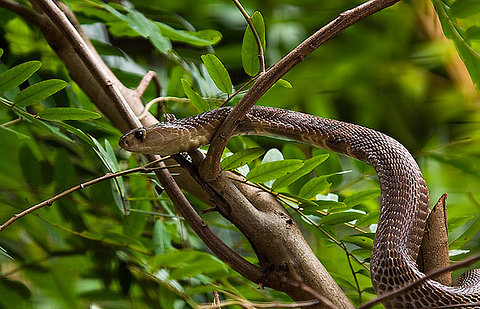 DNA is being recovered from the smuggled venom of Indian Cobras in an attempt to nab the smugglers. DNA is being recovered from the smuggled venom of Indian Cobras in an attempt to nab the smugglers.Smuggling dried cobra venom has its challenges. First there’s the difficulty of milking these highly venomous snakes; it takes time, patience and skill. (It took the legendary snake wrangler Bill Haast three years and 69,000 milkings to produce one pint of coral snake venom, for example.) To read the full article, click here. In an attempt to find the next greatest high, some Indian drug dealers are now making a drug derived from Cobra Venom. Delhi Police on Monday night seized half-a-litre of venom extracted from cobras and other reptiles, which are classified as highly endangered species under the Wildlife Act. To read the full article, click here. Wednesday, March 28 2012NRAAC re-forms, announces annual reptile law symposium
http://nraac.org
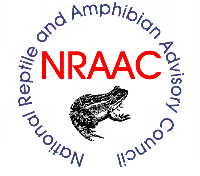 The National Reptile and Amphibian Advisory Council has been re-born to run an annual symposium on reptiles, amphibians, and the law. The National Reptile and Amphibian Advisory Council has been re-born to run an annual symposium on reptiles, amphibians, and the law.In 1997, John Cherry of Cherryville Farms, Stephen Hammack from the Fort Worth Zoo and HISS, and I had dinner after a Texas Reptile Expo in Arlington. By the time our dinner ended, we had convinced ourselves that the reptile community needed a lobbying organization and we were the only three idiots silly enough to take on such a task. We had decided to use the then-new power of the Internet to start, manage, market and run the organization. Thus the original incarnation of NRAAC was born. When we put the organization to bed in late 2001 it had been quite successful for what it was, with a membership in excess of 17,000 and active "cells" in 20 or more states across the U.S., working primarily on state laws and regulations. We had some success in Texas, California and a few other states, but by the time we ended it, the need for the organization had lessened significantly. Additionally, kingsnake.com had overwhelmed my schedule. We had learned much about what to do and not to do when running a lobbying organization, and we all swore never to do anything like that again. Continue reading "NRAAC re-forms, announces annual reptile law symposium" Monday, March 26 2012Conservation center reintroduces Indigo Snakes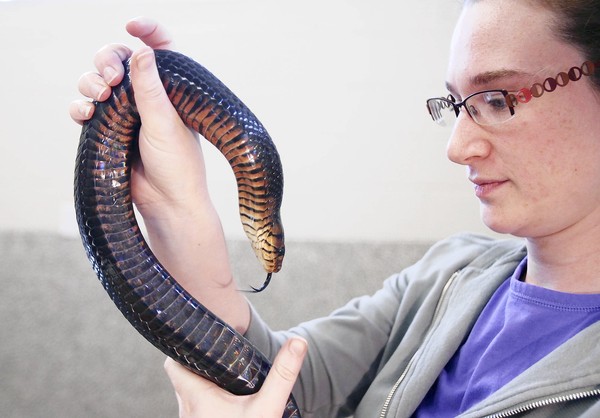 The Orianne Center for Indigo Conservation hopes to save one of Florida's native snakes through their reintroduction efforts. The Orianne Center for Indigo Conservation hopes to save one of Florida's native snakes through their reintroduction efforts.Courtney Russo studies the lustrous black-colored snake loosely coiled in a glass enclosure at a new reptile-conservation facility in northeast Lake County. The rare 5-pound reptile soon will require more food and nutrients, like any expectant mother. As always, the reason for these animals' disappearance can be traced back to human encroachment. To read the full article, click here. Tuesday, March 20 2012Tinley Summit sparks idea for legal symposiumWhile the summit itself is a good place to receive a "State of the Union" address, the limited time allowed and the distractions of an attached reptile expo limit the amount of real work and networking that might be accomplished. As we hope to extend an invitation to virtually everyone with an interest in reptile laws, we have created an open group on Facebook, "neutral ground", that will allow anyone to submit their ideas and input. The group description says it best: "I am looking for people who would like to discuss the proposal/idea of a reptile and amphibian laws and regulations symposium, to be 3-4 days of workshops and talks with all parties with a vested interest, including zoos, universities, all state FW & DNR, USFW, USDA and other interested parties. No reptile expo, no banquet, no auction, completely un-commercial and neutral - just work - if you are interested in participating in this discussion, or possibly assisting/volunteering/participating in this symposium please reply to this thread, or/and send me an email. " Almost 100 people have already joined the group and are offering input, including Marshall Meyers of PIJAC who posted the following in support: "PIJAC, in conjunction with several other national organizations representing zoos, marine parks/aquariums, sport fishing and hunting, food aquaculture, etc., plan on hosting a summit meeting to review problems encountered related to possession, trading, importing, exporting, captive breeding, etc. of non-native species... There is more to Marshall's post, where he reveals more about PIJAC's summit, as well as a new injurious Risk Screening methodology being tested by USFWS that will screen 1,400 species this year and may be one of a number of solutions to our issues with injurious and invasive species. But to read it and to participate in planning the reptile and amphibian law symposium, you will need to join our Facebook group at http://www.facebook.com/groups/344339472269726/ Monday, March 19 2012Report from Tinley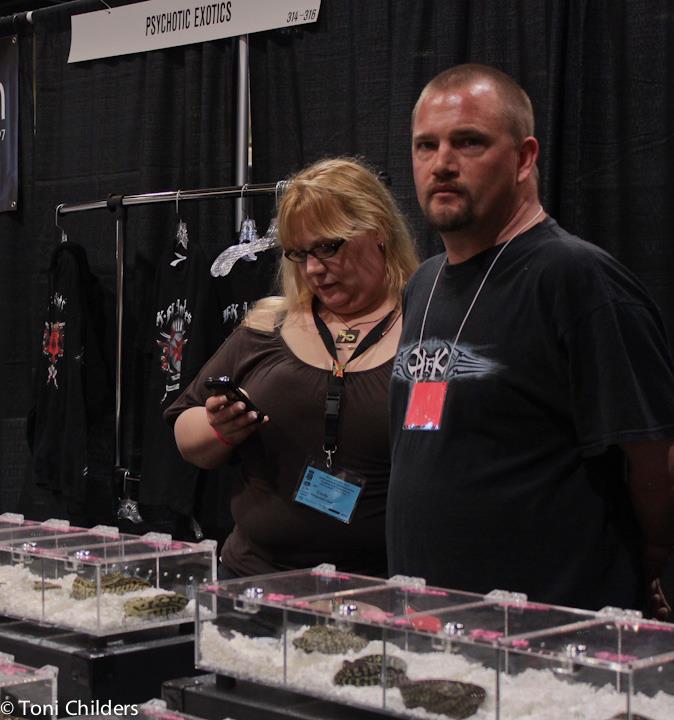 It has been a very long time since Jeff and I were in the same show together but this year, we were both at NARBC in Tinley. It has been a very long time since Jeff and I were in the same show together but this year, we were both at NARBC in Tinley. This was the first time I have ever worked a retail booth at a show. When kingsnake.com used to have booths, it was a hour or so of free shirts and we were off to play. After spending a long time convincing kingsnake.com BFF Kerry King to bring his carpets to Chicago, he ended up a little short-handed at times, so I ended up helping all weekend. Of course that was also where our banner was positioned with our free stickers, so it made sense that I stuck around. I really gained a lot of respect for some of the work our advertisers put into their weekends. It is rough to get up at the crack of dawn and set things up. This, however, is something I am pretty familiar with from my long educational weekends. However, most of my animals that are on display are able to be touched and petted by each and every person who asks. Not knowing the Psychotic Exotic animals well, there was no way I was pulling things out for people to play with.  Thankfully, right around the corner from our booth were two great educational groups, The Chicago Herpetological Society and Windy City Reptiles, with animals to play with. Having them present allowed me to kindly brush off the people wanting to pet their first snake to somewhere more appropriate. And can anyone tell me why it is always the snake with the highest price tag people want to put in their 3-year-old child's hand? Fortuntely, just because someone can't touch doesn't mean they can't learn. Thankfully, right around the corner from our booth were two great educational groups, The Chicago Herpetological Society and Windy City Reptiles, with animals to play with. Having them present allowed me to kindly brush off the people wanting to pet their first snake to somewhere more appropriate. And can anyone tell me why it is always the snake with the highest price tag people want to put in their 3-year-old child's hand? Fortuntely, just because someone can't touch doesn't mean they can't learn. It was nice learning a new aspect of the community. After being with kingsnake for over 10 years, I sometimes think I have done it all. This made me think I should swing by more booths and help out down the road. And quite honestly, I really did learn that if you all need to find me, you will. Thanks to everyone who brought concerns and questions to me. If you haven't already checked 'em out, Jeff took a ton of photos of the show. To see the full album, click here. Top photo - Todd and me working the booth. I am checking ks.com emails. Bottom Photo - Team Psychotic kingsnake, the name JeffB gave us. 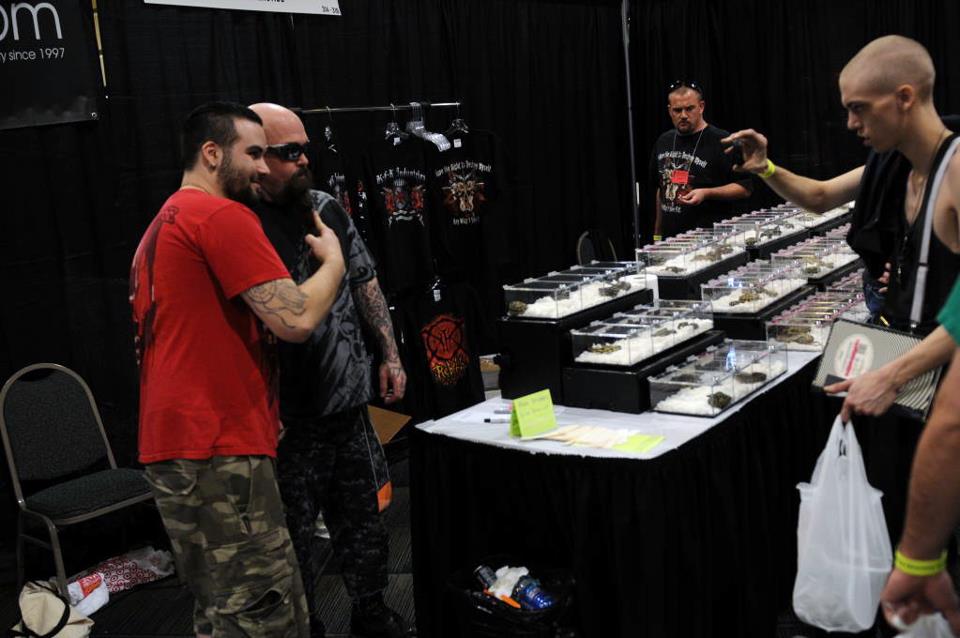 Kerry pre-occupied meeting fans and signing autographs  Me taking a rare chance to sit and chat with my husband who popped in for a visit. 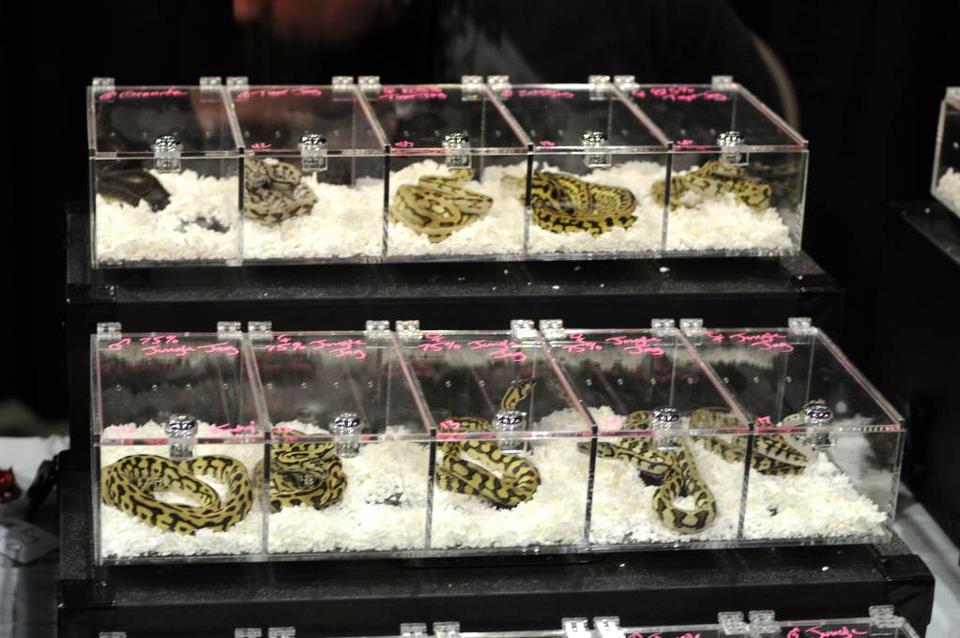 A sampling of the snakes we were selling. Sunday, March 18 2012Expo attendees get their Irish on for St. Patricks DayWhile I was unable to stay for Sundays show due to an early flight out (I got to spend time waiting at the airport with Kevin McCurley from NERD so it wasn't all bad), Saturday's foot traffic was heavy all day, with lots of buyers leaving with full shopping bags, which was bound to make the vendors happy. And there were dozens of vendors from across the country including the Discovery Channel's Swamp Brothers, longtime herpers Stephen and Robbie Keszey at their Glade's Herp Booth, taking pictures with kids and selling reptiles at the same time. Also taking a lot of pictures was Slayer's Kerry King at his Psychotic Exotics booth, who took time out from selling T-shirts and carpet pythons to sign autographs and pose with fans, signing a guitar for the USARK/PIJAC benefit auction later on. His first trip to the Chicago Expo, he is already making plans to return for the fall show, if his tour schedule allows. The Boaphile Jeff Ronne also made an appearance, with both cages and boas, providing a refreshing break in what appeared to be a sea of ball pyon color morphs, and crushing rumors he himself had started regarding the death of his famous beard. Jim Nesci with Cold Blooded Creatures and Bubba his alligator were there too, out in the lobby, giving kids and adults alike an opportunity to get a hands on educational experience with one of natures oldest reptiles. Cold Blooded Creatures was but one of the many educational groups and organizations with booths at this weekends expo, and Saturday was filled with reptile talks by people like the Swamp Brothers, Brian Barczyk and kingsnake.com's own Cindy Steinle. To check out over 200 pictures from yesterdays events head over to our Reptile Summit Photo Gallery. SICK SOFTSHELL TURTLE NEED HELP
My spiny softshell turtle is 24+ years old. Her shell is 10" long. Recently, she is acting ill. She has been biting and killing goldfish but not eating them or anything else. She has developed a black blotch on the back of her neck.
At a reptile store, the manager thought the blotch to be more of an abrasion than a fungus. He also noticed that her back 'toes' had some abrasions. She has been in the same water filled aquarium for many years with no problems. My turtle is now lethargic and barely moves in or out of the aquarium. She used to walk around in the backyard but now hardly any motion. Does anyone have any thoughts on helping my turtle, Myrtle? Thank you Saturday, March 17 2012Reptile law summit draws crowds, raises questions about future Last night's reptile law legal summit in Tinley Park, Illinois, brought together a group of approximately 400 reptile owners, businesses, clubs and organizations to discuss the legal issues facing the herpetology community. Last night's reptile law legal summit in Tinley Park, Illinois, brought together a group of approximately 400 reptile owners, businesses, clubs and organizations to discuss the legal issues facing the herpetology community.Leading off the summit was an outline and discussion of the recently launched Burmese Python Initiative, a rescue program initiated by Bill Brandt and Ben Siegel. With the pending listing of the Burmese Python as "injurious" by the US Fish & Wildlife Service, the BPI hopes to provide options and answers to Burmese Python owners across the U.S. This was followed by a proposal by Justin Meitz, of the Reno Herp Society, to start a National Herpetelogical Society to act as an top level organization connecting local herpetological societies into a connected network, in order to share resources and give the herp societies a voice at the national level. This is an organization that has long been needed by the community, and kingsnake.com fully supports the effort to provide a "national backbone" to these local herp clubs and groups. USARK's Andrew Wyatt provided a historical overview of the USARK organization, what it has accomplished, and what it does with the funds it collects, and spoke about upcoming issues that need to be addressed by the community. Mike Canning, President of PIJAC (Pet Industry Joint Advisory Council), presented a similar overview of their organization as well and its role is in the fight to keep pet reptiles legal in the US. Finally, a panel discussion on current and forthcoming legal challenges facing the reptile world was held with the leaders of these organizations, as well as noted members of the community. Questions were taken both from the audience and from submissions made via the Internet. The frustration of many in the room was felt, and at times it seeped into the questions, and answers. After nearly two hours the panel discussion wound down, leaving some members of the audience and panelists with few real answers (and even more questions than they had at the beginning), but many good directions and ideas. While the idea of a Reptile Law Summit is a good one, in reality the time allotted did not allow for anything more than a surface discussion of the matters at hand. It is time for the community to consider holding a pure reptile law symposium and workshop, not buttressed by or conflicting with a Reptile Expo, to give reptile owners, businesses, and organizations more work space and time to coordinate efforts, share experiences and develop tools and strategies to more effectively deal with the issues we will face in the future, both near and far. Friday, March 16 2012NARBC: Tinley Legal Summit begins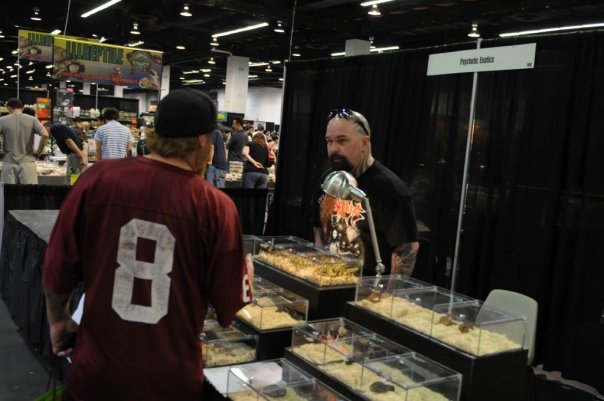 This evening, members of the herp community will come together at the second North American Legal Summit at Tinley Park near Chicago. This evening, members of the herp community will come together at the second North American Legal Summit at Tinley Park near Chicago. The summit, which is free and open to anyone who comes in the door, begins at 7 PM Central Time. The schedule for this evening is: 7:00 PM Ben Siegel - Burmese Python Initiative The NARBC reptile show begins at 11 AM on Saturday; I'll also be giving a talk that day on how to start doing outreach to the general public to benefit the reptile community. Jeff and I will both be at the show, and if you want to get some kingsnake bumperstickers or assorted swag from the past, make sure to swing by the Psychotic Exotics booth and say hi. While you're there, meet Kerry King of Slayer. Jeff and I will be bringing you reports starting this evening and running through the weekend. Watch the blog, our Twitter, and our Facebook page! Thursday, March 15 2012Rare Fungus wiping out rattlesnakes in Illinois
The already small population of the endangered Eastern Massasauga Rattlesnake (Sistrurus catenatus catenatus) is being wiped out by a rare fungus.
Long-term population studies of the snake -- in Illinois and elsewhere -- had never turned up evidence of debilitating fungal infections. But in 2008, biologists studying the snake reported to Allender that they had found three sick snakes in a park in southern Illinois, all with disfiguring lesions on their heads. The snakes died within three weeks of their discovery. A fourth snake with a similar syndrome was discovered in the same park in the spring of 2010. To read the full article, click here. Continue reading "Rare Fungus wiping out rattlesnakes in Illinois" Wednesday, March 14 2012BREAKING: Chicago boy, 11, shot while collecting snakes; reptile community rallies to support Eleven-year-old Tyshaun Grant was in stable condition at University of Chicago Comer’s Children’s Hospital following a shooting near West 59th Street and South Stewart Avenue in Chicago at around 4 p.m. yesterday. The incident occurred while he and his friends were looking for snakes around railroad tracks in Chicago. According to MSNBC: Eleven-year-old Tyshaun Grant was in stable condition at University of Chicago Comer’s Children’s Hospital following a shooting near West 59th Street and South Stewart Avenue in Chicago at around 4 p.m. yesterday. The incident occurred while he and his friends were looking for snakes around railroad tracks in Chicago. According to MSNBC: Community activist Andrew Holmes said the boys were looking for snakes near the railroad tracks when two men in bandanas walked up and shot the child. Kingsnsake.com is working to obtain more information, but a number of people. companies, and organizations in the reptile community are planning to host a fundraiser for the little snake hunter's medical expenses at this weekend's Reptile Law Summit and North American Reptile Breeders Conference in Tinley Park near Chicago. Spearheaded by NARBC's Brian Potter, donation jars and a silent auction have already been planned for the event, and an online donation system has been set up at Chip In. The Pet Industry Joint Advisory Council has already pledged a donation, as have kingsnake.com and others in the community and industry. Items for the auction can be sent to 14416 John Humphrey Dr, Orland Park, Il, 60462, but with the limited time an online donation might be the better option for most. Stay tuned here at kingsnake.com for more information on Tyshaun Grant's condition and to find out how you can help the little snake hunter. Tuesday, March 13 2012Mangrove Monitors & Savnnah Monitors
Im looking at breeding both SAvannah monitors and Mangrove monitors and looking for idea on the best way to do so!
First hearing for Ohio "Dangerous Wild Animal" bill tomorrow Ohio is set to hold it's first hearing on the proposed "Dangerous Wild Animal" bill tomorrow, and a number of pet reptiles are listed in the legislation, directly impacting thousands of reptile owners and businesses in the midwest. Senate Bill 310 sets forth conditions for ownership of certain “restricted snakes” requiring extensive and expensive permitting, as well as up to $500,000 in liability insurance. The following snakes are considered “restricted snakes” in Senate Bill 310: Ohio is set to hold it's first hearing on the proposed "Dangerous Wild Animal" bill tomorrow, and a number of pet reptiles are listed in the legislation, directly impacting thousands of reptile owners and businesses in the midwest. Senate Bill 310 sets forth conditions for ownership of certain “restricted snakes” requiring extensive and expensive permitting, as well as up to $500,000 in liability insurance. The following snakes are considered “restricted snakes” in Senate Bill 310:
To read more about Ohio's "Dangerous Wild Animal" bill, and how you can offer your input, click below to read PIJAC's PetALERT... Continue reading "First hearing for Ohio "Dangerous Wild Animal" bill tomorrow" Monday, March 12 2012Reptile Law Summit on Friday - will you be there? kingsnake.com is again one of the sponsors of this weekends Reptile Law Summit, as well as the North American Reptile Breeders Conference, and I would like to invite anyone with an interest in reptile laws, or the organizations involved with representing pet owners, to attend the meeting Friday night in Tinley Park, Illinois, just outside Chicago. Please make sure to bring any questions, issues, or concerns you may have regarding regulatory issues at the state or federal level, or with the organizations involved, with you to the meeting. I am scheduled to be a panelist Friday night representing kingsnake.com, along with PIJAC's Mike Canning, USARK's Andrew Wyatt, Gary Bagnall from Zoomed and others from the reptile industry and community, where we will be discussing the federal regulation of Burmese Pythons as well as other legal issues facing our community. Hopefully we can address some of your questions and concerns and maybe arrive at some solutions together.
Cindy Steinle and myself will be posting updates and hopefully providing audio and video interviews from the site, so if you are unable to attend please make sure to check in here at kingsnake.com for regular on-scene reports. The Reptile Law Summit meeting Friday night is FREE! ~ for more information on the Reptile Law Summit please visit the NARBC web site at http://narbc.com. Please drop us a note here and let us know if you will be attending. Saturday, March 10 2012Sweetwater, Texas: Leaders in animal abuse since 1958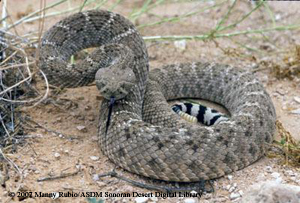 The Jaycees are an organization built around young adults contributing to the betterment of their community. Apparently in Sweetwater, Tex., that means publicly endorsed animal abuse. The Jaycees are an organization built around young adults contributing to the betterment of their community. Apparently in Sweetwater, Tex., that means publicly endorsed animal abuse.As part of their annual Rattlesnake Roundup — which kicks off today and runs throughout the weekend — the Sweetwater Jaycees have posted a bounty of $10 per pound of rattlesnake rustled up and hauled in. That's double the average bounty paid for the past decade. After the high demand on the snakes over the years, the local populations of rattlesnakes are being depleted. Each year bringing in less and less snakes. The snakes become a freak show act that often results in major animal abuse in the public eye. To read the full article, click here. Each year I am left wondering: where are the animal rights activists for the rattlesnakes? Thursday, March 8 2012incubators
does anyone know where i can get a good incubator for under one hundred dollars?
West Virginia law regulating 'exotic, wild' animals close to passage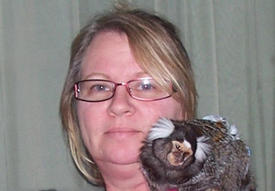 A proposed law to strictly regulate ownership and keeping of many animals deemed "wild" or "exotic" is under consideration by the West Virginia Legislature. The bill, SB 477, was proposed on Feb. 1, passed the state senate on Feb. 14, and was placed on a special calendar earlier today after a series of committee hearings. The legislative session ends tomorrow, and the bill's lead sponsor, Senate President Jeff Kessler, believes SB 477 will pass before the session ends. A proposed law to strictly regulate ownership and keeping of many animals deemed "wild" or "exotic" is under consideration by the West Virginia Legislature. The bill, SB 477, was proposed on Feb. 1, passed the state senate on Feb. 14, and was placed on a special calendar earlier today after a series of committee hearings. The legislative session ends tomorrow, and the bill's lead sponsor, Senate President Jeff Kessler, believes SB 477 will pass before the session ends.The Charleston Daily Mail reported Kessler as saying he "introduced the legislation in reaction to the bizarre story of Terry Thompson, a Zanesville, Ohio, man who last year released over 50 tigers, lions, monkeys, leopards, bears and other exotic animals into his community before killing himself." The bill has been criticized by some West Viriginians for not including a list of animals affected by the legislation, which contains very broad language defining "wild" and "exotic" animals, including birds and reptiles, and could potentially apply to unsocial pet or feral cats. Additionally, the bill calls for lists of "wild" and "exotic" animals, as well as "domestic animals" to be created after the bill is passed, making it difficult for citizens to judge whether the bill will apply to their pets. In the article in the Daily Mail, Kessler told Rhonda Kelly, a woman concerned about her pet marmosets (a primate weighing around half a pound), not to worry: "This is for big huge animals, mostly. Lions, tigers and bears. If they're big enough to rip your face off, those are the kind of things that probably ought not to be running around." However, the language in the currently proposed bill reads far more broadly than that: "Domestic animal", or the plural, means an animal which, through extremely long association with humans, has been bred to a degree which has resulted in genetic changes affecting the temperament, color, conformation or other attributes of the species to an extent that makes them unique and distinguishable from wild individuals of their species, and includes animals that have been bred as companion animals and pets. A comprehensive list of "domestic animals" shall be set forth by the division, in consultation with the department and the bureau, pursuant to the rulemaking authority of this article(.) The bill's progress can be tracked on the West Virginia State Legislature website. Photo: Rhonda Kelly with marmoset, from Daily Mail article. Snapper clogs sewer but has happy ending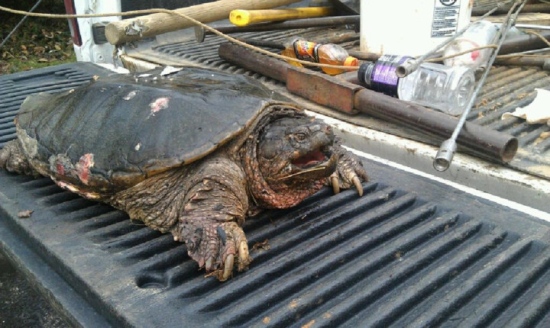 When the streets of Cuyahoga Falls recently had a flooding issue, workers were shocked to find the cause. When the streets of Cuyahoga Falls recently had a flooding issue, workers were shocked to find the cause.The workers thought the problem was clogged leaves or other debris so they used a jet spray that delivers about 2,000 pounds of pressure to force loose whatever was blocking the sewer. To read the full article, click here. Wednesday, March 7 2012Bearded Dragon needs a home!
Male was stained by substrate actually a Hypo/Red Flame if a home is not found by June 21 I will keep him.
Tuesday, March 6 2012Want to help fight for YOUR reptiles Locally? Get Organized NOW!!
Imagine the hypothetical scenario of picking up your weekly town's Tribune one lazy morning on March 2nd and coming across a headline or legislative agenda item for your town council on March 6th reading something to the effect of:
*Board Agenda item 3333333- Final Reading of An Ordinance to prohibit the keeping and sale of Wild, Exotic Animals No doubt your mind will probably be racing at this point as will your heart rate and blood pressure . What should you do? Is it too late to rally the troops? Is it time to move to another area and/or surrender your animals? Luckily, the above situation can be prevented or avoided if one becomes organized and proactive in a myraid of different ways in which I shall describe below. The purpose of my wanting to write this post are two fold: one; to serve as a simple and easily understood guide, or resource for many of those who may not be experienced or familiar in the art of grassroots activism, or what to do and when should a ordinance, bill, or amendment to prohibit the keeping of reptiles and other exotic animals arises in your area. And secondly, the purpose of this post is also largely intended to compliment and follow up on a previous posting on the subject by Cindy Steinle, which can be viewed Here First off, we all need to adopt the mindset of expecting legislation and ordinances coming down the chutes not *if*, but *when*. In other words, we need to expect it coming. As I have previously mentioned, it takes very few catlyists to initiate consideration of these ordinances on the local level. If one is considering moving to an area, please do not specifically inquire to your police department or local lawmaking body about reptiles or exotic animals and certainly please do not keep animals where they are not legal. Case in point: the City of Middleton Wisconsin, whose License and Ordinance committee, along with recommendations from the police chief, began considering an ordinance when an individual with American alligators from Madison WI (where they are presently illegal) requested to keep the animals when moving to Middleton. Having had correspondence with the head animal control officer of Dane County WI following a Dane County Environment, Agriculture, and Natural Resource committee hearing, this particular individual had been implicated in multiple prior incidents of keeping the animals illegally in Madison WI, which was the catlyist that spurred the situation in Middleton, and subsequent involvement, time, manpower, and resources of the Madison area Herpetological Society, of which I serve as Education and Events Coordinator. Having said that, lets examine some of the simple yet proactive steps everyone can and should do to help fight for our animals locally. Get to Know Your Local Government Inside and Out I believe this is one of the most important ones of all. If you are unfamiliar with it, or rusty on the mechanics of local government since last studying it in grade school or middle school, now, prior to anything coming down the chutes, would be an excellent time to referesh yourself as well as others you may wish to network and get involved with on how it works. Among the things I recommend that everyone familiarize themselves with on their local and county governments at a minimum, is how are bills, amendments, or ordinances typically introduced, navigated through the legislative process, and passed. What boards or committees does your local or county government have? How are agenda items typically advertised? Are they printed or broadcasted in the local newsprint or media, posted on city hall's bulletin board, or advertised on the city or county's website? Is there an email subscribe feature to be put on a mailing list for notifications of upcoming agendas, minutes, public hearings, and other legislative activity? Who currently sits on these boards and what is their contact information? One subject I cannot stress enough is that when the time comes where correspondence with your elected officials is necessary, PLEASE be courteous, knowledgeable and respectful towards them. While it is completely understandable that our hobby and our pets (Got it Right there, Cindy) is a passion and life's work for many of us, please do not shout, badmouth, our use vulgarities or profanities towards them. This is simply unprofessional conduct, and will not carry any weight or result in any progress for our cause. Please be polite and courteous, and provide facts, statistics, and personal examples of how such an ordinance relates to you, your friends, or your family. One thing we must understand, is most elected officials are barraged with a variety of topics and issues daily, and cannot possibly be knowledgeable or up to date on everything currently before them. We must also understand that most of the time on a local and county level especially, the crafting and consideration of these ordinances by our elected officials are NOT intended to serve as direct attacks against responsible pet owners, keepers, and breeders and should not be viewed as such. In the case of both Middleton WI and Dane County WI, their stated intent of having an ordinance was to simply address those few instances where negligent and/or irresponsible owners do create a health or safety issue with their animals. Does this mean I am in support of the legislation as it is currently written and proposed? Of course not! Instead, what it comes largely down to a matter of public education, which should include our local elected officials, on the matter. Case in point: one representative on the Dane CO Agriculture, Environment, and Natural Resources board hadn't even known that stores in the Madison WI area sold reptiles or that people kept them in such great numbers! Instead of attacking and alienating one's local elected officials, identify what their main concerns are for proposing the legislation and what problems they are attempting to address with it. If you are involved with reptile rescue, a herpetological society, or any other business or entity that conducts outreach and education for the public, try offering your assistance and input on the matter by directly addressing their concerns and work towards finding a mutually agreeable solution. You may just be surprised at how much further this approach will take you. Organize! Joing a Local Herp Society! The second most important factor (actually tied with the first) to proactively fight for your animals on the local level, is to organize now!!! Do not wait until the last hour or minute to locate and subsequently assemble the troops. If there is one already present, joining any of the education, outreach, and community based local, regional, or state herpetological socieites (or herp socities for short) is also an excellent way of networking with other passionate, motivated, like minded individuals in your area on a variety of subjects pertaining to reptiles and amphibians including legislative matters. In my area of Wisconsin, I am very proud and fortunate to be able to serve as education coordinator and as an active member for the Madison area Herpetological Society (MAHS). Over the past several months, we have been tirelessly engaged and involved with legislation at the local level, all of the way on up to the federal level regarding the python and boa rulemaking. The herp society I am a part of may only be approximately one year old, but in that time, we have managed to become the largest and most active herp society in the state of Wisconsin, and I have little doubt that we will continue to grow and experience the legislative successes we have been having at the local level due to the perseverance and dedicated teamwork all of our members have contributed thus far. If no herp society currently exists in your area, identify any and all locations where individuals who keep or enjoy reptiles may frequent. You may know of some in your area already. Otherwise, make informal inquires around town for contacts and/or networks at any and all local pet or specialty stores, veterinary clinics, schools, universities, museums, nature centers, fairs or pet shows, or others. Even if one resides in a small town, I suspect that it would not be overly difficult to locate at least a dozen, if not more, interested and dedicated individuals to stand behind you in the cause. Assembling such a successful and focused grassroots network in such an uphill battle is certainly no small undertaking, and it will undoubtedly require large amounts of time, motivation and energy (and not to mention missed sleep) for successes to happen, given the seemingly daily barrage of legislation coming down the tubes. However, the simple illustration I would like to make, and conclude with, is that legislative victories for us in the herp community CAN and DO happen if we organize, network, and stay aware of legislative happenings. The involvement of MAHS in fending off and/or influencing both the Middleton WI and Dane Co WI bans thus far are proof positive of the shining star efforts we can all make on local communities. When these ordinances come up, especially on the local level, they are almost always passed unanimously under our radar simply because very few, if any residents in those respective communities have taken an active role in paying attention to and involving themselves in their local government. That is what will kill us if many more people do not start paying attention. Board members or other local governing bodies operate on the assumption that if they do not hear from their residents and constituents, that the measures they propose will not apply to anyone, or to only a very tiny few. SPEAK UP!!! Make your Voices Known!! Testing evolution in the Bahamas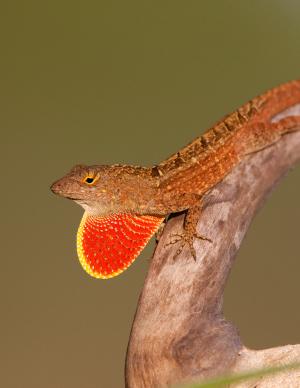 A group of Rhode Island scientists took a snapshot of evolution in action on a deserted Bahamian island with transplanted Brown Anoles. A group of Rhode Island scientists took a snapshot of evolution in action on a deserted Bahamian island with transplanted Brown Anoles.After several years and multiple generations of lizards, the researchers found that both natural selection — whereby traits that enhance survival get passed down from generation to generation — and random processes contributed to the animals' genetics and their physical characteristics. To read the full article, click here. Monday, March 5 2012
Male Leucistic/Red Flame Beardie needs a home! tank setup and lights included. If no home is found by June 21 I will keep him
World's smallest Chameleon discovered in Madagascar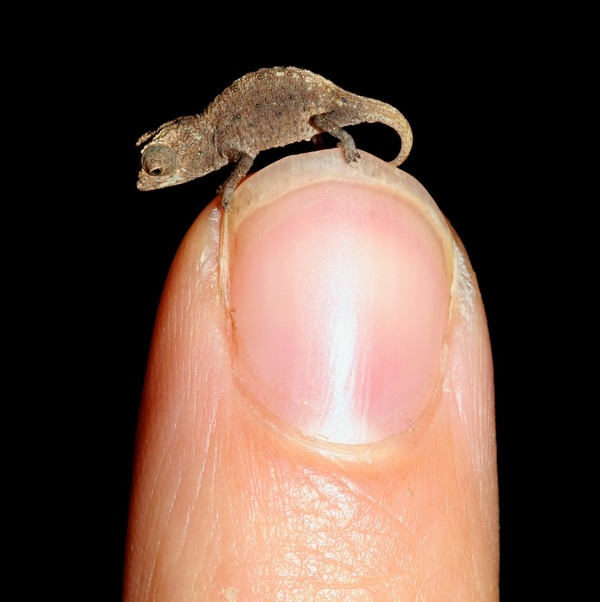 Nature's tiniest Chameleon has been discovered in Madagascar: Nature's tiniest Chameleon has been discovered in Madagascar:A species of chameleon small enough to easily perch on a match head has been discovered on a tiny island off Madagascar, a group of scientists has announced. To read the full article, click here.
(Page 1 of 1, totaling 24 entries)
|
Our SponsorsArchivesCategoriesSubscribe |
|
AprilFirstBioEngineering | GunHobbyist.com | GunShowGuide.com | GunShows.mobi | GunBusinessGuide.com | club kingsnake | live stage magazine
| ||||||||




